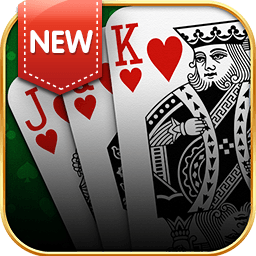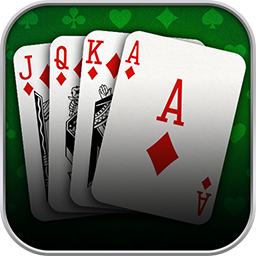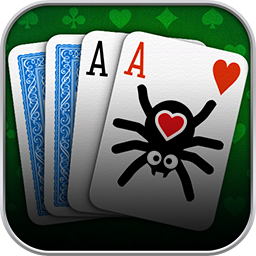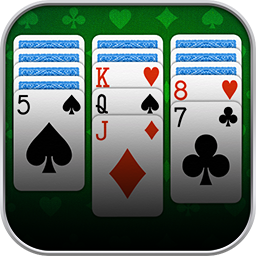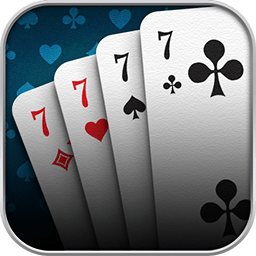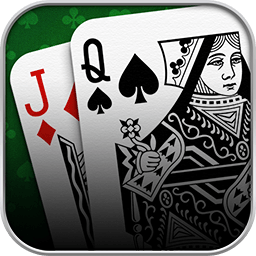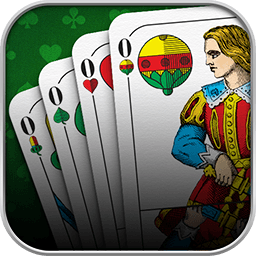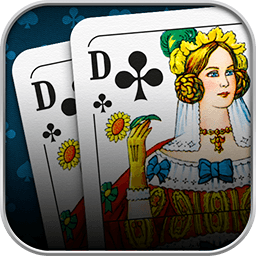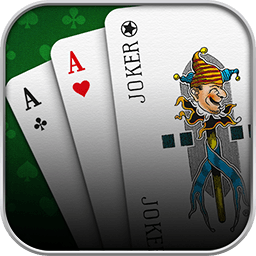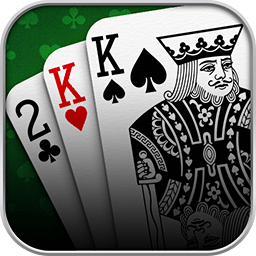No one can know everything. We collected all important terms concerning Canasta in this glossary for you. There are plenty of recurring terms used for explaining Canasta rules, and some of them have synonyms, too.
3 Decks (Custom Rule):
With this custom rule, you are using an additional deck in the game.
3 Jokers per Deck (Custom Rule):
Use this custom rule to play with one more Joker per deck.
Alliance:
In a game of four, Canasta is played with alliances or teams. Two players form one team. The teams remain throughout all played rounds at the table. In our Canasta Palace, your ally is placed in the top center of your screen and marked blue. Players of an alliance or team share their melds and scores.
Black Threes (Cards):
Black Threes act as block cards: Placed on the discard pile, they prevent the next player from drawing there or picking up the entire discard pile. Black Threes can only be played in the very last meld when going out.
Black Threes (Custom Rule):
This custom rule raises the penalty score for black Threes. Left in hand by the end of the round, each black Three yields 100 negative points instead of five.
Blocking:
When you place a black Three or a wild card on top of the discard pile, it is blocked for the next player; they can neither draw from the discard pile nor pick it up. The blockade is lifted once the player following you finished their turn.
Bonus Cards:
See Red Threes.
Canasta:
This is the name of the game and one of its key elements at the same time. A natural canasta ist a meld that consists of at least seven natural cards of the same rank. If wild cards are used, it is a mixed canasta.
Custom Rules:
At the tables at the Canasta Palace, you can use custom rules to tweak the game the way you like it best. Enabling 3 Decks and Sequences, for example, lets you play the popular Canasta variation Samba Canasta.
Discard Pile:
The cards discarded at the end of each player’s turn are collected in a stack here. Under certain circumstances, a player can pick up the entire discard pile, which can decide a round’s outcome.
Draw 2 (Custom Rule):
Here, you must draw two cards instead of one card from the draw pile.
Draw Pile:
This stack of cards contains all cards that weren’t dealt at the beginning of the round. Players can draw one card from the draw pile at the beginning of their turn. The draw pile is also known as the stock.
Freezing:
The discard pile is frozen when it contains a wild card but also when the discard pile’s first card during dealing is a red Three. Freezing complicates drawing from the discard pile for all players: The pile can be thawed only by melding its top card with two natural hand cards.
Finisher:
This is the player who wants to go out and thus finish the round. To do so, you must have completed at least one canasta, and be able to play all your remaining cards, optionally placing the last one on the discard pile. In a game of four, you can and should ask your teammate for permission before going out.
First Meld:
Each party’s first meld of a round must reach a minimum score to be allowed. The minimum scores are 15, 50, 90, or 120 points in a game without custom rules, depending on how many points you gained in the previous rounds at that table.
Going Out:
Ending a round is called going out in Canasta. This is done by playing all your remaining hand cards and optionally discarding one. You can only go out if your party has melded a canasta by the end of your final turn. To go out in a game of four, you can ask your ally for permission and only go out if it is granted.
Going out Concealed:
When a player goes out in the same turn in which they play their party’s first meld, they are going out concealed.
Hand Cards:
Those are all cards in a player’s hand. They are distinguished from the cards in the playing field – in melds, in the discard pile, and in the stock.
Harder First Meld (Custom Rule):
The minimum thresholds for the first meld of a round are raised from 15, 50, 90, 120 to 50, 90, 120, 150 points with this custom rule.
Joker:
There are four Jokers in standard Canasta with two decks. Along with all eight Twos in such a game, they make up the wild cards.
Meld:
A meld is a set of natural and wild cards combined according to the rules and placed in the playing field. Placing a meld in the playing field is referred to as playing or melding. Each party’s initial meld of a round is called first meld.
Mixed Canasta:
A mixed canasta consists of natural cards and wild cards. However, wild cards must not outnumber natural cards. Some other terms for the mixed canasta are black canasta and dirty canasta.
Natural Canasta:
A natural canasta, also red or clean canasta, is a meld that consists of at least seven natural cards of the same rank.
Natural Cards:
Ace, King, Queen, Jack, and the pip cards Ten to Four are the natural cards in Canasta. They are used for melds and have no further function.
Party:
A game of Canasta has two opposing parties. A party can be either one player or a team of two players.
Permission:
In a game of four, a player can ask their teammate for permission to go out, i. e., finish the round. Once asked, the answer is binding.
Playing Field:
The playing field consists of the stock, discard pile, and the melding areas, where you put down your melds when playing them. Each party has their own melding area on the playing field. The stock and the discard pile are placed next to or between these areas.
Points:
The goal of Canasta is to be the first party to reach 5,000 points. These are collected over several rounds at one table. If both parties reach 5,000 points at the end of the same round, the party with the higher total score wins. You can get points by playing melds, finding bonus cards, completing canastas, and going out. Under certain conditions, red Threes and black Threes can also cost you points.
Red Threes:
In Canasta, red Threes are bonus cards. These cards have no function beyond dealing bonus points. Whenever you receive a red three, it is automatically revealed on the playing field, and you get a supplement card. For each red Three collected during a round, you score 100 bonus points at the end of the round. If your party collects all red Threes, you receive 400 additional points for that round. But if your party does not complete at least one meld in that round, all bonus points for red Threes turn into negative points.
Round:
At a table of Canasta, several rounds can be played. Each round’s scores are collected to determine the total score of a table. A round ends with one player going out or if the stock is depleted.
Samba:
This is a popular variant of Canasta. Samba Canasta requires three decks and allows melding sequences (e.g., 4-5-6-7-8-9) as well as sets of cards. At the Canasta Palace, you can modify your game to Samba Canasta using custom rules.
Set:
Several cards of the same rank, optionally substituted with wild cards, form a set. Sets of at least three cards can be played as melds.
Sequence (Custom Rule):
This custom rule allows melding sequences, as well. Sequences are limited to seven cards of the same suit, no wild cards. The cards must be consistent and in order. The lowest possible card in a sequence is 4. There can be several sequences of the same suit. A completed sequence is worth 1,500 points.
Stock:
See Draw Pile.
Strict Discard Pile (Custom Rule):
Enabling this custom rule freezes the discard pile permanently. Cards from the discard pile cannot be used to add cards to a canasta.
Strict Wild Cards (Custom Rule):
This custom rule limits the maximum number of wild cards in a meld to two. Wild cards cannot be added to a canasta. After the first meld, at least five natural cards need to be used before adding wild cards.
Surprise (Custom Rule):
At the beginning of the round, three additional cards are placed face-down under the discard pile. The first player picking up the discard pile thus receives a little surprise of three secret cards.
Table:
At the Canasta Palace, you can play Canasta at different tables. Tables can be limited to specific numbers of rounds. Different custom rules can be activated at the tables. When entering the Palace, just choose a table that looks good to you.
Team:
See Alliance.
Tough End (Custom Rule):
When using this custom rule, going out requires either two canastas or one natural canasta.
If the custom rule Wild Canasta is activated as well, only the party going out receives a bonus for their complete wild canasta. If a party has a complete wild canasta but doesn’t go out, the points for the wild canasta are forfeited.
If Tough End is combined with the custom rule Sequences, going out requires two canastas at any time, natural or not.
Training (Custom Rule):
When enabling this custom rule, the table is not ranked for the league. This way, you can practice risk-free. You still gain experience points at these tables.
Turn:
The turns in Canasta go clockwise. Each player must start their turn by picking up one card from the stock or, if possible, one or more cards from the discard pile. Afterward, they can make several moves, such as meld cards, adding to existing melds, or even going out. Except when going out, a turn must end with discarding a card from the hand to the discard pile.
Undo:
Sometimes, actions need to be undone. Should you play a few cards but realize along the way that your melds would not meet the requirements for the first meld, for example, you can use the undo button to pick all cards back up and try a different approach.
Wild Cards:
Jokers and Twos act as wild cards in Canasta. They can substitute other cards in melds as long as they don’t outnumber the natural cards. Wild cards can be used to freeze the discard pile. As long as the wild card is on top of the discard pile, that pile is also blocked.
Wild Canasta (Custom Rule):
Enabling this custom rule allows each party to play a single meld consisting of wild cards only. It is limited to seven cards.
A big wild Canasta (more Jokers than Twos) scores 2,000 points, a small one (more Twos than Jokers) scores 1,000 points. However, incomplete wild canastas yield 1,000 penalty points.
If the custom rule Tough End is activated as well, you will get the bonus for your complete wild canasta only if your party is the one to go out. If your opponents go out, the points for your wild canasta are forfeited.
